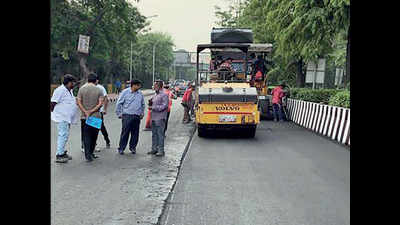- News
- City News
- delhi News
- North Delhi Municipal Corporation to use plastic waste for colony roads
Trending
This story is from September 18, 2019
North Delhi Municipal Corporation to use plastic waste for colony roads
The capital’s plastic waste may soon be made useful with North Delhi Municipal Corporation planning to utilise it in laying and repairing colony roads. The north corporation is planning to use the processed material from recycled plastic as an additive in building material used for repairing roads and making tiles. Corporation commissioner Varsha Joshi said they were exploring the usage of plastic mixture in road repairs. “An agency has also offered to demonstrate use of plastic tiles,” she added.

Last week, Noida Authority had resumed road resurfacing work using plastic waste
NEW DELHI: The capital’s plastic waste may soon be made useful with North Delhi Municipal Corporation planning to utilise it in laying and repairing colony roads.
The north corporation is planning to use the processed material from recycled plastic as an additive in building material used for repairing roads and making tiles. Corporation commissioner Varsha Joshi said they were exploring the usage of plastic mixture in road repairs.“An agency has also offered to demonstrate use of plastic tiles,” she added.
A senior corporation official pointed out that a similar experiment was carried out long time ago on Underhill Road near Civil Lines when an entire stretch was laid using plastic granules. “Such roads have higher durability and are less prone to develop potholes due to waterlogging,” he said.
“Plastic granules are already being produced in bulk using recycled plastic in outer Delhi areas. These can be easily powdered and added to the bitumen-asphalt mixture before spreading it on construction material,” the official added.
It is estimated that the roads made with plastic additives do not require any repair for four-five years. “As these roads are better suited for light vehicles, these processed materials should be used for colony roads, service lanes and footpaths. Heavy vehicles such as trucks can damage plastic roads,” the engineer added.
Last week, Noida Authority had resumed road resurfacing work using plastic waste in Sector 14. About three tonnes of plastic were used to repair a 4km-stretch between the Noida entry gate and Mahamaya Flyover near Film City. The Authority, which is using 8% plastic in the mixture, has planned to set up a plant where shredded plastic can be used in construction material. An official said rag pickers would segregate plastic waste before depositing it with the Authority.
Delhi is the largest contributor to the country’s 25,940 tonnes of plastic waste generated every day, making it essential to adopt new ways to dispose of the trash. According to a 2015 Central Pollution Control Board report, Delhi produced around 689.5 tonnes of plastic waste daily. Almost 70% of the plastic in Delhi is of the single-use variety and most of it ends up in drains and landfills.
The north corporation is planning to use the processed material from recycled plastic as an additive in building material used for repairing roads and making tiles. Corporation commissioner Varsha Joshi said they were exploring the usage of plastic mixture in road repairs.“An agency has also offered to demonstrate use of plastic tiles,” she added.
A senior corporation official pointed out that a similar experiment was carried out long time ago on Underhill Road near Civil Lines when an entire stretch was laid using plastic granules. “Such roads have higher durability and are less prone to develop potholes due to waterlogging,” he said.
“Plastic granules are already being produced in bulk using recycled plastic in outer Delhi areas. These can be easily powdered and added to the bitumen-asphalt mixture before spreading it on construction material,” the official added.
A senior engineer, however, pointed out a practical difficulty that the civic body would have to overcome to make the project a success. “The temperature fall is rapid when plastic powder is added to the hot bitumen mix. While a normal bitumen mixture takes three-four hours to cool down, the plastic-added mix has to be used in one-two hours. Hence, the distance between the hot mix plant and the location where roads are being laid will be crucial,” he said, adding that if the trucks get delayed, the mixture will turn into a rubbery mass.
It is estimated that the roads made with plastic additives do not require any repair for four-five years. “As these roads are better suited for light vehicles, these processed materials should be used for colony roads, service lanes and footpaths. Heavy vehicles such as trucks can damage plastic roads,” the engineer added.
Last week, Noida Authority had resumed road resurfacing work using plastic waste in Sector 14. About three tonnes of plastic were used to repair a 4km-stretch between the Noida entry gate and Mahamaya Flyover near Film City. The Authority, which is using 8% plastic in the mixture, has planned to set up a plant where shredded plastic can be used in construction material. An official said rag pickers would segregate plastic waste before depositing it with the Authority.
Delhi is the largest contributor to the country’s 25,940 tonnes of plastic waste generated every day, making it essential to adopt new ways to dispose of the trash. According to a 2015 Central Pollution Control Board report, Delhi produced around 689.5 tonnes of plastic waste daily. Almost 70% of the plastic in Delhi is of the single-use variety and most of it ends up in drains and landfills.
End of Article
FOLLOW US ON SOCIAL MEDIA










